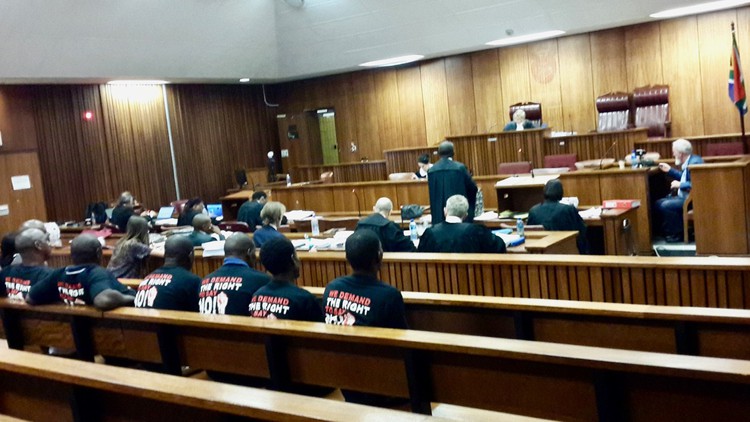Community consent needed before granting mining rights, court hears
Not according to the Act says mine company lawyer
“Free, prior and informed consent” from a community is required before the Department of Mineral Resources (DMR) grants a company mining rights in an area, Advocate Tembeka Ngcukaitobi argued in the Pretoria High Court on Monday. He is representing the Amadiba Crisis Committee (ACC).
The three-day court case between the ACC and DMR follows a long battle by the ACC to prevent Transworld Energy and Mineral Resources (TEM) from getting titanium mining rights in Xolobeni. TEM is a subsidiary of Australian mining company MRC. Xolobeni is a village in Umgungundlovu on the Wild Coast.
In September 2016, Minister of Mineral Resources Mosebenzi Zwane announced an 18-month moratorium on mining in the Xolobeni area. This froze the application by TEM and prevented any further mining applications.
Ngcukaitobi said that if the proposed mining project continued, it would “severely disrupt people’s lives and the resources of the community”. He said it would break apart cultural cohesion and deny access to grave sites of the Pondo people.
About 70 households will be directly affected and many more residents indirectly affected, according to papers filed to court by Duduzile Baleni, head woman of the Umgungundlovu community. In her founding affidavit, with 128 other applicants, she said many of the households earn income from farming, fishing and eco-tourism. She said mining will displace residents from their homes, ruin fields and gardens, cause the loss of communal resources such as medicinal plants and wood, and block access to the sea.
“The mine is presented as a developmental project but it is undisputed that there will be a radical alteration of land usage,” Ngcukaitobi told the court.
He said the community is not trying to hinder development but wants the government to make meaningful submissions on how it plans to develop the area, compensate the indigenous people, and preserve their culture and practices.
“If the [mining project] is going to develop the community, why should it be without their consent or input?” asked Ngcukaitobi.
However, Advocate Vincent Maleka for the DMR argued that Section 23 of the Mineral and Petroleum Resources Development Act clearly outlines the criteria for when the Minister should grant mining rights to a company. He said consent from the community was not listed as one of the criteria in the Act.
“It would mean inserting words into the Act and there is no legal basis to superimpose this requirement of consent. Consent may come into play at a later stage, once the mining right has been awarded and the implementation phase begins, but consent is not required to grant mining rights,” said Maleka.
He said if the mining project fulfilled all the requirements listed in the Act, the Minister was obliged to grant the company mining rights.
Maleka said the Act already obliges the Minster to ensure that the mining will not result in “unacceptable pollution, ecological degradation or damage to the environment”. He said this addresses the core issues raised by the Xolobeni community.
“Therefore, under the Act the Minister has the authority to grant mining rights even without the consent of the community,” said Maleka.
The case continues until Wednesday.
Support independent journalism
Donate using Payfast

Don't miss out on the latest news
We respect your privacy, and promise we won't spam you.
Next: End to seven-month strike by Port St Johns municipal workers
Previous: Why the Fish River Sun land claim case took 20 years
© 2018 GroundUp. 
This article is licensed under a Creative Commons Attribution-NoDerivatives 4.0 International License.
You may republish this article, so long as you credit the authors and GroundUp, and do not change the text. Please include a link back to the original article.

